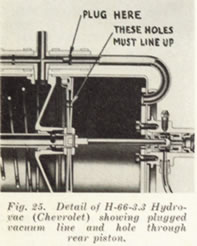Servicing the Bendix Hydrovac
51. To check the length ot the push rod, fit the rear cylinder
shell in position over the piston and against the center plate; do not use a
gasket at this time between the cylinder shell and center plate.
NOTE: The hydraulic cylinder has not yet been assembled to the cylinder
shell.
 |
52. Using the special gauge, Fig. 24, check the length
of the push rod by measuring the distance fronm the end of the cylinder
shell (no gasket) to the end of the push rod. If the push rod is too long
or if it lacks more than .030” of touching the gauge, reset the piston
on the Piston rod so that the push rod comes to the required length. Lock
and stake both piston nuts.
53. Place the retainer washer, the rubber seal and the leath el seal in
the mounting flange end of the hydraulic cylinder. Dip the rubber seal in
hydraulic fluid before assembly but do not oil the leather seal, since it
is oiled sufficiently whe manufactured and excess oil will damage the leather
seal. |
54. Attach the hydraulic cylinder to the rear cylinder shell.
55. Dip the hydraulic cylinder piston assembly and piston cup in hydraulic fluid
and place the piston assembly cup and spring in the hydraulic cylinder; install
the stop and end plug.
56. Place new gaskets on both sides of the center plate.
57. Dip the power cylinder piston leathers in B—K Vacuum Cylinder Oil;
also apply a liberal coat of this oil to the cylinder walls.
58. Place the cylinder shells in position over the pistons and firmly against
the center plate. Line up cylinder shells and center plate with the scriber
marks made before disassembling. Tighten the through-bolts evenly.
59. Place shellac on the threads of the fitting of the front cylinder shell
and install the control valve.
Page <18>
